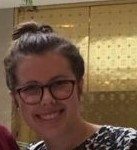Lauren Shumpert is a sociology major and is minoring in both social and economic justice and women’s and gender studies. She is currently working on her sociology undergraduate honors thesis under the advisement of Dr. Andy Perrin. In addition to having completed an internship with SHIFT NC (Sexual Health Initiatives for Teens), she is working as a research assistant for Dr. Kate Weisshaar.
She was interviewed by Melissa Manzanares, UNC Sociology’s Assistant Director of Undergraduate Studies.
What encouraged you to get involved in research?
I knew it would be a useful skill for me in terms of future careers regardless of what career path I took. A strong research background is helpful for anybody, and doing research at UNC has helped me do it in a structured, guided setting.
What made you choose to work with the lab/group/mentor you’re with?
I found out about an opportunity to work with Dr. Kate Weisshaar after taking classes with her. The topic was very interesting to me, as well as the type of work we would be doing. I worked on transcribing and coding interviews, in addition to working on an audit study. I think the project allows me to work with a nice mix of qualitative and quantitative data.
What do you like most about your work?
I like that I get a lot of one-on-one interaction with Dr. Weisshaar. It’s really helpful for me. I take my work very seriously, but I’m also not afraid to make mistakes and learn. I also know that the work that we do really matters. It’s not busy work. It’s work that will be published on topics that matters. I know the time I do spend working on it is meaningful.
Has this experience changed your ideas about what research is and how it’s done?
Yeah, I better understand the value of research. When you’ve done your own research and put in your own time, you’re more confident about the work you’ve done. You’ve seen the legwork in the backend, and you feel strong about it. You have a sense of ownership over the project.
Do you think you might want a career that involves research?
Yeah, I like the social sciences and working with people. I would like to have a job where I have the “hard skills” of working with data, while also being able to have one-on-one interactions.
What do you want to do as a career?
I’m really interested in pursuing public health and health care law. Specifically, public health policy and the legal side of health inequality. I would like to use my skills of working with people and serving the community, while also being able to be research focused.
What is the most valuable lesson you’ve learned from this experience?
I’ve learned how important presentation is. With all of the research that you do, the value comes from how you are able to apply what you learn and how you are able to communicate your findings to help other people. I think the value of research lies in what you do with your research.
What has been the most difficult part of your research experience?
Research is not always exciting. You have to remember why you wanted to do this. Individual tasks can be monotonous, but you have to recognize that they are all important to getting you towards your goal.
What is something cool you’ve learned working in your lab that you didn’t know before?
I’m super excited about the audit study that I’m helping with. It’s very hands-on. Right now I’m a campus tour guide, and I tell visitors that research is not just test tubes and stuff. The project that I’m working on right now makes me feel as cool as anyone doing STEM research. I’m not always reading or writing, I also do hands on work.
Do you get to work with any interesting equipment?
Dedoose is the coolest thing. I learned it in Lisa Pearce’s Research Methods class. So when I was asked to use it in my current research position, I was very comfortable and excited. I love everything you can do with that software.
Do you think people have any misconceptions about undergraduate research or the type of research you do in particular?
People don’t think there’s a lot of opportunities outside of hard sciences, and that’s certainly not true. You might have to be open minded about the topic you are working on, but the research experience will be useful. I think another misconception is that it’s just helpful to list on your resume, but you can get so much more out of it. I gained a lot of skills from my research opportunities.



